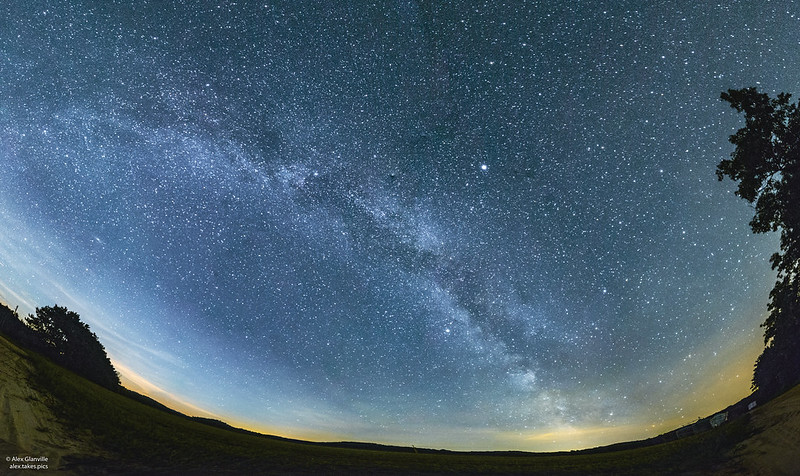It certainly can!
The Milky Way is strongly visible during the Summer months because we're on the side of the Sun that lets us see the Galactic Core. For instance,
this photo was taken in June 2017. The Galactic Core is the brightest spot but as you get to the upper left corner it fades away. The Milky Way is still there, but the arms aren't nearly as bright as the center so they're harder to see. I took a panorama of the night Sky last August in Wisconsin but I haven't put it together or really done any editing on it but I'll see what I can do in the near future. It'll serve a much better visual aide than this single photo. During the other months, we can (sort of) see the outward facing arms of the Milky Way. One important note is that you shouldn't go during a Full Moon since it'll wash out a lot of the night sky next to it. Usually 7 days before & after (as well as a New Moon) are the best nights to go.
Regarding location, you can definitely see it in Maine! Now, how high the Galactic Core is over the horizon varies based on your latitude. Those in Australia can see the Milky Way directly overhead during these months while myself in California can see it healthily over the horizon. Somewhere like Maine will find the galactic core to the Milky Way a little lower but still visible. My app, PhotoPills, puts galactic core visibility from about 10pm to 2am in July for you in Maine. But I encourage you to do your own research so you know where to look and where you should go.
Use a site like
DarkSiteFinder to find a place with low light pollution. Or, if you prefer something more offline,
check out this blog to learn how to add this to Google Earth.
(Which is what I do because you can also simulate the Milky ways position in Google Earth as well) There's also some great information here regarding light pollution, and how much light pollution affects the night sky. It also introduces you to the "Bortle Scale" with a neat infographic. There's also this blurb:
Ethan Siegel wrote:
In order to hit a 1 on the Bortle scale, the amount of artificial light around can be no more than 1% the total natural light from the pristine, Moonless night sky. The most light-polluted urban areas typically hit eight or nine on the Bortle scale, meaning that the amount of artificial light polluting the night sky is at least 2700% the natural amount.
Ideally, you'll want some place with no light pollution in the direction of the Milky Way. And not just any place, somewhere South of the biggest offending location. Why?
Imagine this. You're in Omaha Nebraska so your light pollution map looks something like this. Through research you find that the Milky Way rises in the South and sets in the West. If you go North and just to the East of Onawa, you'll have to look over the city to see the galactic core. Which, is going to be a pain in your rear because the galactic core may not be high enough to clear the light pollution. I say may because that's 60 miles away from Omaha, so it's possible the light pollution from the city may not be a big factor.
But, if you can go down South to Auburn or Tecumseh, you'll have better luck as there's no huge light polluter to the South or West for a while. The biggest light polluter is Kansas City but they're slightly to the East of where you'll be looking.
As far as Maine goes, I'll leave that to you to figure out. I only used the cities above as an example. If you want to send me a PM of where you are in Maine, I can certainly try and help you find some locations and tell you where to look. But that should be mostly your responsibility since I don't want to plan your whole weekend or night, and then not be able see the Milky Way because it's behind a mountain or I gave wrong advice.
I hope you get to see it this Summer, or even next! Please share any photos you may take and any astonishment you feel when you look at the night sky 








